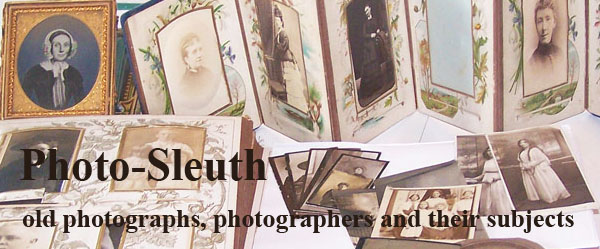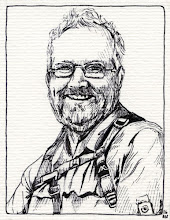

These three boys are dressed identically and appear very close in age (about 10 or 11), which makes me think that they are perhaps friends rather than brothers. The studio setting is of a style which was common throughout the 1860s and early 1870s.
The reverse of the card mount includes the claim, "By special appointment to his Excellency Sir Jas. Ferguson." According to the online edition of the Australian Dictionary of Biography, after a spell as Governor of South Australia from 1869 to 1872, Sir James Ferguson (1832-1907) was appointed Governor of New Zealand in November 1872. He held this post until his resignation in 1875, after which he returned to England. Presumably, then, the card mounted was printed during or shortly after the period that Ferguson was in office. Since the they were printed by the firm of Marion Imp and, as far as I am aware they didn't have works in New Zealand, it doesn't seem likely that De' Maus would have been able to order and have the card mounts produced quickly enough after Ferguson's appointment to have them in use before the end of 1872. This narrows down the period to, say, from 1873 to 1876.
David Alexander De' Maus (1847-1925) was born in Edinburgh and arrived in Otago on the Caribou in 1867. However, he had an older brother James De' Maus (born in 1835, also in Edinburgh) who arrived in New Zealand some years earlier. James had operated a photographic studio at 25 Hanover Street, Edinburgh in 1864 (and possibly earlier), prior to emigrating, and then opened a studio in Princes Street in late 1864. From 1866 until 1868, he had premises in Fleet Street, although he was listed as "John de Maus" in Wise's Dunedin Directory for 1868 (in the Auckland City Library's Photographers Database). The North Otago Times of 5 April 1867 and the Otago Witness of 6 April 1867 (from Papers Past) both describe James De' Maus' studio on the westerly side of Princes Street as one of many buildings that were completely destroyed in a huge fire on the night of 1 April.

Advertisement from the Tuapeka Times of 21 March 1868
Image © and courtesy of Papers Past & the National Library of New Zealand
He filed for bankruptcy on 24 August 1868 (NZ Gazette Otago, 1868, no.57, p284, in the Auckland City Library's Photographers Database) and by December that year he was advertising in the Tuapeka Times (5 Dec 1868) as a manufacturer and importer of photographic goods. Peter Stubbs has more on James De' Maus on his EdinPhoto web site. This includes some information that James moved to Fiji in 1869, where he settled in the then capital Levuka, on the island of Ovalau. The Daily Southern Cross of 3, 23 & 26 December 1870 contains details of a charge made on board the H.M.S Rosario against James De Maus, publican of Levuka, by the consul Mr March, which resulted in the deportation of De Maus, an action greatly protested by the citizens of Levuka, who proceeded to demand for the removal of the consul. He was eventually released and returned to Levuka.

David spent his first few years in New Zealand touring the West Coast Goldfields as a singer and composer of humorous songs and sketches. An advertisement in the West Coast Times of 30 March 1869 offers entertainment "in his drawing room." In the same paper on 30 April, a report on had "Mr De Maus although suffering from a cold, sang a comic song, entitled 'Paddy McGee's Dream,' in first-rate style ... [and] 'Not for Joseph,' which was well received." In the West Coast Times of 16 Dec 1869, a list of unclaimed letters at Hokitika Post Office included two for D.A. De Maus.
An entry in the Auckland City Library Photographers Database reports that he settled in Port Chalmers around 1875. However, an item in the Otago Witness of 6 April 1872 shows that he was entertaining folk at the "Port Chalmers Masonic Hall on Tuesday evening ... delight[ing] the audience by giving several ditties in character, and these, with other, were deservedly encored." It seems likely that he was already established by this time, as a report of the H.M.S. Dido in the Port Chalmers Graving Dock in the West Coast Times dated 31 December 1872 states, "During the forenoon Messrs De Maus and Asher, of Port Chalmers took photographs of Dido from numerous points of view; and, in the afternoon, Mr Burton, from Dunedin, also photographed her ..." It seems possible that David took over the business of his brother James upon the latter's departure for Fiji in 1869, as the last advertisement of DAD-M's musical exploits on the West Coast appeared in the Grey River Argus on 29 Jun 1869.
D.A. De' Maus then operated a studio in Port Chalmers, at various addresses, until his death in 1925. He became most well known as a photographer of shipping. He also became active in local sports clubs and politics, and served several times as a councillor and mayor.
The New Zealand Bound web site by Olwyn Whitehouse provides a short biography of D.A. De' Maus as well as descriptions of a selection of his photographs. His huge collection of negatives, mainly of shipping photographs, is now held by the Alexander Turnbull Library and many are included in the Timeframes online collection.








No comments:
Post a Comment